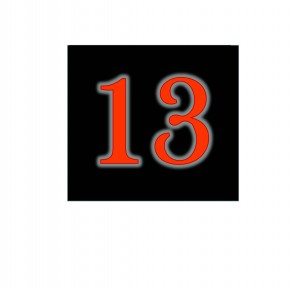 Here’s a vocabulary word for you – triskaidekaphobia. Ever heard of it? Ever experienced it? Of course you have. Triskaidekaphobia is the fear of the number 13.
Here’s a vocabulary word for you – triskaidekaphobia. Ever heard of it? Ever experienced it? Of course you have. Triskaidekaphobia is the fear of the number 13.
Did you ever wonder why the number 13 is considered an unlucky number? As with most things in our culture, it is rooted deep in our human history. And we’ve all come in contact with triskaidekaphobia, the fear of 13. That’s why there are no 13th floors in buildings. Do you know towns even suffer from triskaidekaphobia? I once delivered pizzas in New Castle, Indiana. The north/south streets are numbered and the east/west streets are lettered. But there is no 13th street. There is a 12th Street and a 14th Street. The street between the two is named . . . Main Street. So, why does our culture have triskaidekaphobia?
The most obvious reason for triskaidekaphobia comes from Christian history. It was unlucky to have 13 people at a dinner table because Jesus and his twelve disciples were at the table for the Last Supper. Judas is considered to be the 13th person present. I seriously doubt this was the only time all 13 were gathered around a dinner table, but my purpose isn’t to question our superstition but to figure out the origin of our triskaidekaphobia.
Another piece of triskaidekaphobia comes from the village of Tyburn, which is now part of London, England close to the area of the Marble Arch. Tyburn was synonymous with capital punishment, because this is where London’s criminals and religious martyrs were executed. (You can learn more about Tyburn and the Tyburn Gallows here.) The hangman at Tyburn was paid a fee of 13 pence for each execution.
Here are some other reasons for triskaidekaphobia:
- Some ancient European religions had 12 good gods and 1 evil god. The evil god was considered the 13th god.
- A meeting of witches, called a Sabbath, requires 13 witches to be present.
- The Code of Hammurabi, a Babylonian law code, contains 282 laws, but does not have law number 13.
- A year with 13 lunar cycles was considered bad luck because it caused problems for the monks in charge of the calendars and all of the religious festivals.
- (I even hate to bring this one up.) According to the Old Testament, women were unclean during their menstrual period. If the menstrual cycle is 28 days, then the woman is “unclean” 13 times a year.
Another thing I found while researching triskaidekaphobia is that some people believe having 13 letters in your name can be evil. Examples: Charles Manson, Saddam Hussain, Jeffrey Dahmer, and Edgar Allan Poe. So, if you are looking for baby names, you might want to keep the number of letters in mind. Unless you don’t have triskaidekaphobia.
There’s nothing logical about our triskaidekaphobia. There are a lot of little things throughout our history that give 13 a bad name. But others see 13 as good luck. We can all name great athletes who have worn that number. The Egyptians and Chinese see the number as lucky. Even the back of our one dollar bill is covered with the number 13, because the 13 colonies. Look at this article for some information about that. So maybe we have our reasons for triskaidekaphobia, but perhaps we also have reasons to celebrate this number as well.